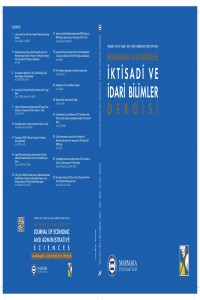Abstract
This study analyzes the effect of Ramadan on the market index (Borsa Istanbul-BIST 100) and 23 BIST
Sectoral Indices in Borsa Istanbul over the period between January 1997 and December 2015. According
to the analysis, the average returns of tourism, service, transportation, electricity, and chemical industries
are higher than the market index during the Ramadan period. Moreover, according to regression analysis
results, Ramadan has a statistically positive effect on 5 sectors (BIST Transportation, BIST Non-Material
Mineral Products, BIST Investment Trust, BIST Electricity, and BIST Chemicals). Also, this study divides
the Ramadan days into 3 periods, where the first period comprises the first 10 days of Ramadan, second
period covers the next 10 days, and the final period involves the last 10 days. The first ten days of Ramadan,
for the most of indices, has both positive and statistically significant returns.
References
- ALATIYAT M. A, “Ramadan Effect on UAE Stock Market, https://www.researchgate.net/publication/263090131_Ramadan_Effect_On_UAE_Stock_Market_-_ Banks_Sector, Accessed on (10 June 2016).
- AL- BUKHARI, S., http://sunnah.com/bukhari, Accessed (11 July 2016).
- AL-ISSISS, M., “The Holy Day Effect”, Journal of Behavioral and Experimental Finance, 2015, pp. 60-80.
- AL-HAJIEH, H., Redhead, K., and Rodgers, T., “Investor Sentiment and Calendar Anomaly Effects: A Case Study of the Impact of Ramadan on Islamic Middle Eastern Markets” Research in International Business and Finance, 2011, pp. 345-356
- ALRASHIDI, F., Ahmed, M., and Beneid, F., “The Calendar Impact and Trading Behaviour: An Empirical Evidence from Around the Globe”, International Business & Economics Research Journal, 2014, pp. 1025-1032.
- BIAŁKOWSKI, J., Bohl, M. T., Kaufmann, P., and Wisniewski, T. P., “Do Mutual Fund Managers Exploit the Ramadan Anomaly? Evidence from Turkey”, Emerging Markets Review, 2013, pp. 211-232.
- BIAŁKOWSKI, J., Etebari, A., and Wisniewski, T. P., “Fast Profits: Investor Sentiment and Stock Returns during Ramadan”, Journal of Banking and Finance, 2012, pp. 835-845.
- FRIEDER, L., and Subrahmanyam, “Nonsecular Regularities in Return and Volume”, Financial Analysts Journal, 2004, pp. 29-34.
- HALLAMI, B. B., Argyle, M., The Psychology of Religious Behavior, Belief & Experience, Routledge, London, pp. 188.
- HUSAIN, F., “A Seasonality in the Pakistani Equity Market: The Ramadhan Effect”, The Pakistan Development Review, Spring 1998, pp. 77-81.
- IQBAL, M. S., Kouser, R., and Azeem, M., Conventional and Islamic Anomalies in Karachi Stock Exchange, http://connection.ebscohost.com/c/articles/95569682/conventional- islamic-anomalies-karachi-stockexchange. Accessed (15 June 2016).
- KÜÇÜKSILLE, E., and Özmutaf, N. M., “Is There Ramadan Effect in Turkish Stock Market?”, Uluslararası Alanya İşletme Fakültesi Dergisi, 2015, pp. 105-110.
- ODABASI, Y., and Argan, M., “Aspects of Underlying Ramadan Consumption Patterns in Turkey”, Journal of International Consumer Marketing, pp. 203-218.
- OGUZSOY, C. B., and Güven, S., “Holy Days Effect on Istanbul Stock Exchange” Journal of Emerging Market Finance, 2004, pp. 63-75.
- RAMEZANI, A., Pouraghajan, A., and Mardani H., “Studying Impact of Ramadan on Stock Exchange Index: Case of Iran”, World of Sciences Journal, 2013, pp. 46-54.
- SANDIKCI, O., and Omeraki, S., “Globalization and Rituals: Does Ramadan Turn into Christmas? ”, Advances in Consumer Research, 2007, pp. 610- 615.
- SAYYED, F. J., Abraham, A., and Al-Hajji, M., “Seasonality in stock return and volatility: The Ramadan Effect”, Research in International Business and Finance, 2005, pp. 374-383.
- SHAH, R., and Ahmed, N., “The Ramadan Effect on Stock Market”, European Academic Research, 2014, pp. 4712 4720.
- WEBER, M., The Protestant Ethic and Spirit of Capitalism, Trans: Stephen Kalberg, London: Fitzroy Dearborn, 2001.
Details
| Subjects | Economics |
|---|---|
| Journal Section | Makaleler |
| Authors | |
| Publication Date | July 19, 2017 |
| Submission Date | July 20, 2017 |
| Published in Issue | Year 2017 Volume: 39 Issue: 1 |
Cite
Marmara University Journal of Economic and Administrative Sciences is licensed under Attribution-NonCommercial 4.0 International


